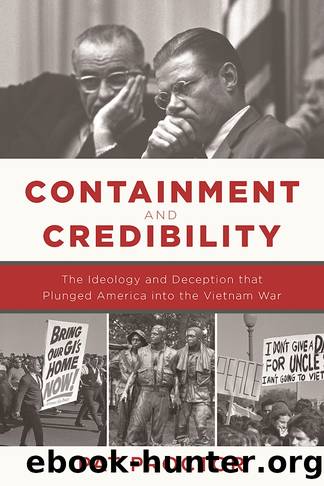Containment and Credibility by Pat Proctor

Author:Pat Proctor
Language: eng
Format: epub
Publisher: Skyhorse Publishing
Published: 2016-01-15T00:00:00+00:00
⦠the war in Vietnam is essentially a civil war which involves no direct threat to the national security of the United States. That the war cannot be won without running unacceptable risks, including the risk of a world war. But that, nonetheless, a unilateral American withdrawal would leave a situation of confusion and disorder in South Vietnam. Accordingly, the Democratic Party [should commit] itself to a policy of seeking, through the Paris peace negotiations a peace settlement based on the principles of self-determination and neutralization.204
Senator George McGovern, representing supporters of slain candidate Robert Kennedy, argued that the platform should contain a pledge that the United States would âcease our opposition to participation by the NLF in the government of South Vietnam.â205 McGovern also proposed that the platform contain a â60-days-to-peaceâ plan that included the immediate withdrawal of 275,000 U.S. troops. Senator Eugene McCarthyâs camp argued only that the platform should include support for communist participation in a coalition government in South Vietnam.206
While Vice President Hubert Humphrey was less specific about his own policy prescription, he rejected suggestions that would end the war without containing communist expansion into South Vietnam. Humphrey implied that such suggestions would alienate the American people and urged antiwar delegates to be practical by reminding them that none of the urgent domestic needs of the country would be addressed if Richard Nixon became president. Humphrey even suggested that he might make either McGovern or McCarthy his running-mate (in the end he chose Democratic Senator Edmund Muskie of Maine instead). Humphrey also promised he would âdo all that is humanly possible without regard to my own political future to bring ⦠peace as speedily and as honorably as I can.â The emphasis on âhonorablyâ separated him from the other two men, who had laid out terms for ending the war that he believed the American people would not accept.207
Johnson administration officials took the opportunity of the platform committee to once more use the ideology of containment to argue for continued U.S. military intervention in Vietnam. Secretary of State Dean Rusk took the extraordinary step of appearing before the Democratic party platform committeeâpresumably on behalf of the Humphrey campâto argue against making any concessions to the North Vietnamese a part of the Democratic party platform. In a reference to the lessons of Munich, Rusk equated antiwar recommendations to saying, âGive the aggressor another biteâperhaps heâll be satisfied.â Rusk also argued against saying, âItâs too far away,â âItâs not our business,â or âSecurity treaties should be ignored if they come to involve cost, pain and sacrifice.â Rusk claimed that there was no need to debate the âdomino theoryâ since the communists were already active across Southeast Asia. He added that events in Southeast Asia were directly tied to U.S. and world security. Like Humphrey, Rusk argued that the Democratic platform should affirm the partyâs desire for âan early but honorable peace that will enable the peoples of Asia to live together in freedom.â208
In the end, the Democratic platform reflected President Johnsonâs and Vice President Humphreyâs wishes.
Download
This site does not store any files on its server. We only index and link to content provided by other sites. Please contact the content providers to delete copyright contents if any and email us, we'll remove relevant links or contents immediately.
The Secret History by Donna Tartt(19096)
The Social Justice Warrior Handbook by Lisa De Pasquale(12191)
Thirteen Reasons Why by Jay Asher(8914)
This Is How You Lose Her by Junot Diaz(6890)
Weapons of Math Destruction by Cathy O'Neil(6282)
Zero to One by Peter Thiel(5804)
Beartown by Fredrik Backman(5759)
The Myth of the Strong Leader by Archie Brown(5510)
The Fire Next Time by James Baldwin(5450)
How Democracies Die by Steven Levitsky & Daniel Ziblatt(5219)
Promise Me, Dad by Joe Biden(5154)
Stone's Rules by Roger Stone(5088)
A Higher Loyalty: Truth, Lies, and Leadership by James Comey(4965)
100 Deadly Skills by Clint Emerson(4927)
Rise and Kill First by Ronen Bergman(4790)
Secrecy World by Jake Bernstein(4754)
The David Icke Guide to the Global Conspiracy (and how to end it) by David Icke(4720)
The Farm by Tom Rob Smith(4514)
The Doomsday Machine by Daniel Ellsberg(4491)
